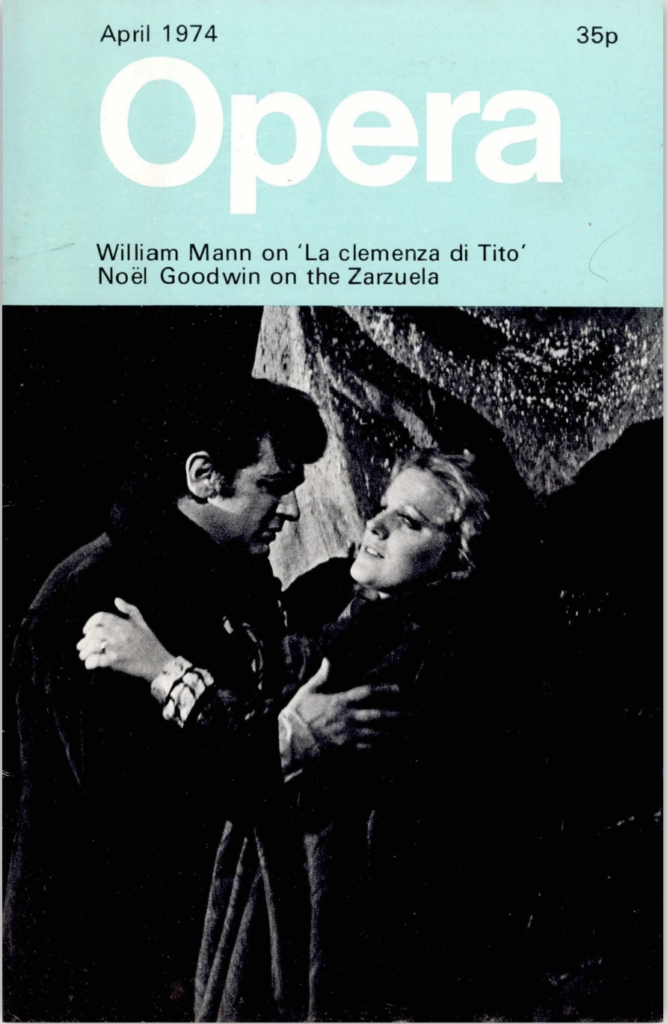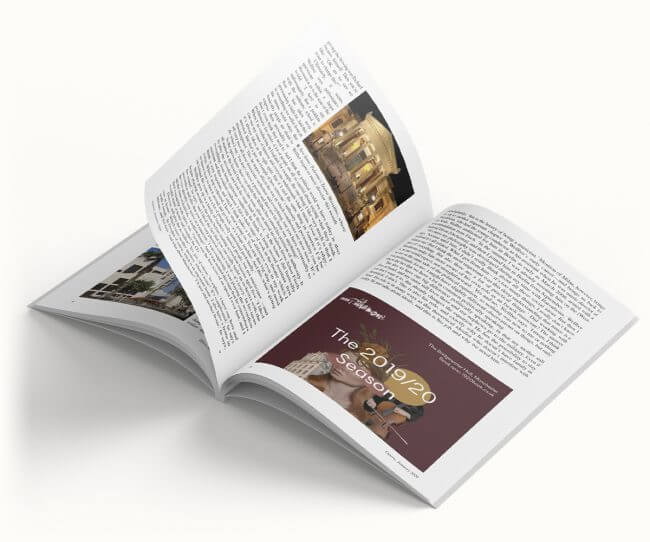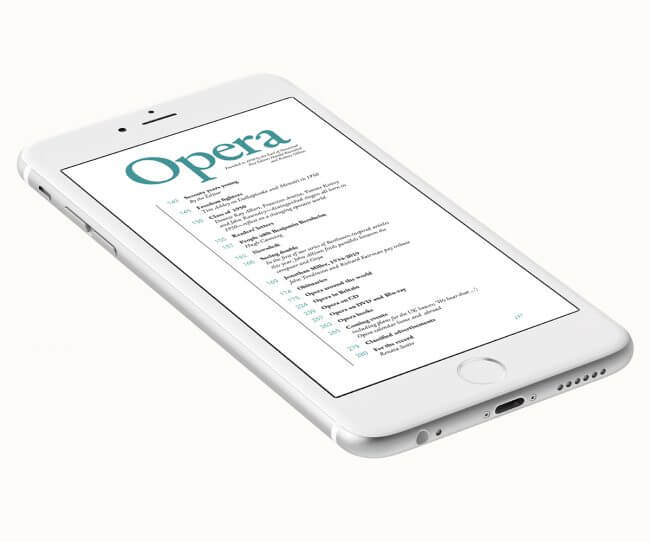Kristīne Opolais
October 2015 in People
By Rian Evans
Obsession. Kristīne Opolais admits this is the only word to describe how, when she became a member of the chorus of Latvian National Opera at the age of 22, she found herself swept up in a new and intoxicating world, astonished by the power of opera to engage and move. ‘From the moment I got into the opera chorus, I was almost living there-I went home just to sleep. I thought I would love to have some bed at the opera house not to waste time! I was kind of crazy, but this was obsession in a good way.\’
That response is surely a clue to what has brought Opolais, at 35, to where she is today, in huge demand at some of the world\’s biggest houses, feted for her singing of Puccini roles-most recently Manon Lescaut, with Jonas Kaufmann as Des Grieux. Her capacity to inhabit a role, living and breathing the character she\’s portraying, is remarkable: she captivates and holds her audience. Our meeting takes place in Antonio Pappano\’s office at the Royal Opera House, where the photographs on the walls make it something of a shrine to Giacomo Puccini. Opolais\’s instinctively verismo approach would surely have delighted Puccini, and she laughingly suggests that, given her passion for his music, they would probably have enjoyed a big love affair. Covent Garden is one of the houses where her portrayals of three Puccini heroines-Cio-Cio-San, Tosca and Manon Lescaut-have met with much success, but Opolais\’s base is Munich, strategically chosen for its relative proximity to her native Latvia and for the strong relationship she has with the Bayerische Staatsoper. It is there that she makes a much-anticipated role debut this October as Margherita in Boito\’s Mefistofele, alongside René Pape as the demon himself. It\’s safe to predict that she will throw herself into the part with absolute conviction.
Opolais\’s revelling in her first immersion in opera took her by surprise, but not so her mother, who, possessed of a fine dramatic voice herself, always recognized her daughter\’s potential. Coming home from work, she knew immediately if the young Kristīne had been singing that day-the hairspray can was no longer where she\’d left it and, microphone in hand, Kristīne would have been giving her best Madonna routine to an imaginary audience. Opolais remembers that, even as a five-year-old, she knew that she could make people notice her and, growing up, she was intrigued by the way in which a film actress could make the smallest expressions-a look, a turn of the head, a gesture-communicate and be meaningful. Many would say that this is exactly what sets Opolais apart today.
Reluctantly, persuaded by her mother, she agreed to singing lessons, but the four-hour bus journey to Riga from her home in Rēzekne was hard going and was abandoned after six months. A second attempt went better, and she got a place at the Latvian Academy of Music. Singing went well, but not the theory, and Opolais is forthright about that disinclination to apply herself: ‘Even at school I had problems-in mathematics it was a big protest, because I didn\’t want to do it; it was not interesting. And when teachers asked me, “What you will do, Opolais, with your future life? Look, you are one of the most horrible kids, and you have low marks!”-not in every subject, I should say!-I said I will not need it and I was right.\’
At the Academy, frustrated by the apparent need to conform to a type, Opolais already sensed she wasn\’t like everyone else. A combination of self-doubt and the financial costs made her leave. At the back of her mind was the memory of her first teacher\’s remark to her mother that she ‘had possibilities\’ but was ‘nothing special\’; but then private training with a vocal coach restored her confidence, the chorus beckoned and she was accepted.
Opolais instantly made up for lost time: she listened and learnt, staying on when the chorus wasn\’t needed, absorbing everything. An audition for the company\’s new music director brought her debut as Musetta, fast-tracking her into solo roles and swiftly afterwards into leading roles including Liù, Cio-Cio-San, Tosca, Tatyana, Lady Macbeth of Mtsensk, Senta. In her mid 20s she was enjoying the success many dream about and with which most would be content. Writing in opera about her performance in The Queen of Spades in Riga\’s 2005 Opera Festival, Shirley Apthorp wrote: ‘Kristīne Opolais was a Lisa with the lithe beauty of a wild animal, fabulous passion and a melting, burnished, gripping sound.\’ Significantly, the conductor, also much praised by Apthorp, was Andris Nelsons, the young music director who\’d auditioned her, the man who would become her husband. Musically and emotionally-and, with Opolais, the two seem inextricably linked-it was a potent time. Opolais also credits the then Intendant of Latvian National Opera, Andrejs Žagars, with having taught her a great deal. ‘Žagars was an actor by training, quite famous in the former Soviet Union as well as Latvia, and I loved working with him. As a director he demonstrated what he wanted in terms of the acting. For me it was a huge key.\’
Latvian success took her to the Berlin Staatsoper, which Opolais counts as the start of her international career. Invited to sing Tosca at the Theater Unter den Linden in 2006, she repeated the role there the following year. In 2007 too, Tosca was the role in which Opolais made her Greek National Opera debut. Opolais\’s maternal grandfather was Greek, so the occasion meant much at a personal level, and Athens was a reminder that a Maria Callas video given to Opolais when she was younger had been a galvanizing influence. Yet, despite such success, her gut feeling was that things weren\’t right; she didn\’t much like her own voice and wanted to think carefully about her next moves. Opolais now looks back at those early years, asking herself how she did it and at what cost. ‘I could sing three different roles in a week and for this I have to give thanks to God that I survived and was able to finish each performance. When people ask me how it\’s possible that I sang Aida or Tosca at that stage in my career, I have no idea. I just remember I wanted it, and I thought I could do it. But, at the end of each one, I could feel the vocal strain and I knew it was not good.\’
It was her fellow Latvian Elīna Garanča\’s suggestion that Opolais seek lessons from her own teacher, Margreet Honig. It was a turning point. ‘Margreet gave me the opportunity to find my natural voice-she actually changed everything, step by step,\’ says Opolais. ‘In the first year I thought I should give up this profession. It was only in the second year I started to believe in myself. I was 27 when I met Margreet, and she thought I was young enough to start again from the beginning. What she does with the breath and the voice is like singing yoga. She said, “When you open your mouth, you immediately start to force: you are not singing with your own voice, you are singing with some very mature, experienced voice.” Gradually, I started to be myself, and really it took me all these years to understand how to sing in a natural way, every word as clearly as speaking. Well, almost-of course it\’s impossible in the high register.\’
Opolais is frank in recognizing her chameleon-like ability to take on the voices of others. ‘I got through those early years by listening. I am not a theory person-I would never teach, I have no ideas-but I have good ears. I listened to Renata Tebaldi and was influenced by what she did. When I was 26 and singing Aida, I was listening to Aprile Millo at the Met and it helped a lot. When I did Butterfly I sang with a Scotto voice-I could imagine her sound and I could produce it. But sometimes I didn\’t know whether this muse would come to me today or not-will I hear the voice which I need to sing or not?\’
Honig worked on channelling Opolais\’s naturally dramatic instincts-roles she\’d sung before now felt very different and Opolais\’s gratitude to her teacher is immense. Achievements continued to stack up. In 2008 she returned to Berlin and the Staatsoper as Polina in Prokofiev\’s The Gambler, with Daniel Barenboim conducting. Hearing a concert performance of La Bohème, the first opera for Andris Nelsons (to whom she was now engaged) with his City of Birmingham Symphony Orchestra, I was amazed by the grace and vocal poise of her Mimì, everything wonderfully expressive and deeply felt. In Act 3 Opolais somehow took on a pallor, gradually crumpling as life drained away, all the while sitting on an ordinary chair. It was spellbinding.
Opolais\’s interpretations draw primarily on her imagination, but sometimes on her own experience. Teenage years in post-Soviet Latvia were not easy, her upbringing not straightforward-Kristīne, an only child, learnt to fend for herself. In retrospect too, the time spent taking lessons with Margreet Honig in Holland, eking out the money, had something of the artist in the garret waiting to make good. She laughs: ‘I am afraid of mouses very much and there was always mouse or some animal droppings on the bed, aaaagh! Certainly, difficult experiences, good and bad, gave me this opportunity to be strong, to not be afraid.\’
Such acting talent clearly appeals to directors and, while Opolais chooses her commitments carefully, she can also take risks, and is prepared to take over at short notice. In October 2010, when Nina Stemme pulled out of the Bayerische Staatsoper\’s new Rusalka, Opolais stepped into the breach, figuratively and literally: Martin Kušej\’s vision for the piece-captivity and abuse inviting comparison with the notorious Josef Fritzl case-meant her spending much of the evening soaking wet. Though she\’d only sung part of the role of Rusalka before, the range of vocal colours it offered made it irresistible; but accepting was a gamble since she was due to make her debut in New York as Musetta. The Met released her (she would successfully make her debut there as Magda in La rondine in March 2013) and Rusalka was acclaimed as a theatrical triumph. The following May saw a thrilling Covent Garden debut in Madama Butterfly with her husband conducting (Opolais and Nelsons had married at the beginning of 2011).
The birth of their daughter Adriana that December marked another joyous milestone. Then came trauma for the couple when, at three months old, their baby needed life-saving surgery. Adriana recovered miraculously and is a bright, lively and healthy child, but such experiences imprint themselves in the maternal memory and since that crisis Madama Butterfly is an opera that has utterly different emotional significance for Opolais-nearly losing her child herself makes Cio-Cio-San\’s sacrifice almost unbearable. ‘I feel now I must ration the number of these performances, it is so hard. And Jenůfa I have already said “Not again!”-her suffering and anguish is too terrible. I know you should sing without being overcome by these feelings but, unfortunately, I am giving each performance more than 100 per cent. I don\’t act it, I live it, but I feel I cannot do it another way.\’
Her vocal and emotional stamina were put to the test in her first Butterfly at the Met in April 2014. John Rockwell wrote in opera: ‘She acquitted herself admirably. As a commanding Latvian blonde, she seems hardly the ideal physical type to portray a diminutive, 15-year-old geisha. Nor is her soprano as refulgent as those of some past Butterflys have been. Yet Opolais is an artist. She sang with conviction, acted truly and brought this manipulative yet annoyingly moving melodrama to a fervent emotional climax.\’ Just hours later, Opolais would further endear herself to New York and a global audience by singing Mimì in the afternoon\’s live broadcast of Bohème. After Butterfly Opolais had enjoyed a celebratory, try-to-wind-down supper, eventually getting to bed at 5am. Then she was woken by a 7.30am call from Peter Gelb at the Met with a desperate request: Anita Hartig was ill; would she consider stepping in? At first she refused, but quickly rang back. Not knowing the production, she was walked through it, and went on to give another searing performance.
It\’s fairly certain that Opolais will wow New York once again next spring when she and Jonas Kaufmann sing in Richard Eyre\’s new production of Manon Lescaut, with Fabio Luisi conducting. Her debut in the role (replacing Anja Harteros) came in Jonathan Kent\’s Covent Garden staging in June last year, when she and Kaufmann got exceptional reviews. The Editor noted ‘the electricity generated by the starry leads […] Here Covent Garden struck gold. Opolais phrased “In quelle trine morbide” with aching beauty and throughout the evening scaled her voice up with glowing tone or reduced it to a silvery thread as required. Together in Act 4 they generated musico-dramatic heat.\’
Opolais\’s instrument may not be perfect, as she would be the first to insist. Perceptions of her voice still vary, but the elements she brings to a performance, translating to both CD and DVD, are undeniable: natural bearing, a vibrant intensity, whether ecstatic or deranged, and the sheer physicality of her characterizations. Hugo Shirley in his review of her Covent Garden Tosca in March 2013 said she acted ‘with the level of detail and conviction that rendered the diva irresistibly compelling and sympathetic […] Michael Volle\’s confrontation with Opolais\’s Tosca was visceral and riveting, not least because the Latvian soprano so successfully captured Tosca\’s playfulness, heart and, above all, classy glamour. She sang intelligently, finding considerable power in her essentially lyrical voice when required.\’
The looks speak for themselves, though photos don\’t do justice to her porcelain skin or the Baltic-pale eyes. Yet vanity doesn\’t come into it-on stage Opolais looks as good or as bad as the drama demands. And if there are moments when she herself must make demands, this usually stems from her acute sense of responsibility for her child-‘I am not trusting to nannies at all\’-or, in the theatre, from issues which impede her singing-‘Hair!\’. She flinches at the notion of diva-dom. ‘I only want to give my best, and I love my profession, but I also need silence. I found out about myself that I am not very ready for big publicity, because I think I already give so much on stage.\’ She smiles wryly: ‘It should be enough!\’
For the moment, her Boito debut is all-engrossing. Later in the season it will be Halévy, when Opolais sings Rachel in Munich\’s La Juive, with the Met\’s new Manon Lescaut in between. Opolais and her management are understandably cautious about flagging up what lies further ahead, though the singer drops occasional hints, with Elsa in Lohengrin possibly on the cards. And she\’d be happy with more Puccini: there is talk of Il trittico and she would love to sing Minnie in La fanciulla del West. That would set all the Opolais emotional guns firing.









